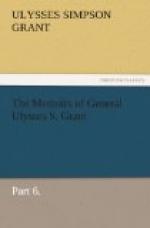I now find, after over thirty days of trial, the enemy deems it of the first importance to run no risks with the armies they now have. They act purely on the defensive behind breastworks, or feebly on the offensive immediately in front of them, and where in case of repulse they can instantly retire behind them. Without a greater sacrifice of human life than I am willing to make all cannot be accomplished that I had designed outside of the city. I have therefore resolved upon the following plan:
I will continue to hold substantially the ground now occupied by the Army of the Potomac, taking advantage of any favorable circumstance that may present itself until the cavalry can be sent west to destroy the Virginia Central Railroad from about Beaver Dam for some twenty-five or thirty miles west. When this is effected I will move the army to the south side of the James River, either by crossing the Chickahominy and marching near to City Point, or by going to the mouth of the Chickahominy on north side and crossing there. To provide for this last and most possible contingency, several ferry-boats of the largest class ought to be immediately provided.
Once on the south side of the James River, I can cut off all sources of supply to the enemy except what is furnished by the canal. If Hunter succeeds in reaching Lynchburg, that will be lost to him also. Should Hunter not succeed, I will still make the effort to destroy the canal by sending cavalry up the south side of the river with a pontoon train to cross wherever they can.
The feeling of the two armies now seems to be that the rebels can protect themselves only by strong intrenchments, whilst our army is not only confident of protecting itself without intrenchments, but that it can beat and drive the enemy wherever and whenever he can be found without this protection.
U. S. GRANT,
Lieutenant-General.
(35) COLD HARBOR, VA., June 6, 1864.
MAJOR-GENERAL D. HUNTER
Commanding Dept. W. Va.
General Sheridan leaves here to-morrow morning, with instructions to proceed to Charlottesville, Va., and to commence there the destruction of the Va. Cen. R. R., destroying this way as much as possible. The complete destruction of this road and of the canal on James River is of great importance to us. According to the instructions I sent to General Halleck for your guidance, you were to proceed to Lynchburg and commence there. It would be of great value to us to get possession of Lynchburg for a single day. But that point is of so much importance to the enemy, that in attempting to get it such resistance may be met as to defeat your getting onto the road or canal at all. I see, in looking over the letter to General Halleck on the subject of your instructions, that it rather indicates that your route should be from Staunton via Charlottesville. If you have




